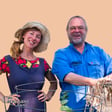
Attachment Planeting with Josh McLean
Have you considered the backstory of your leather shoes? Are you curious about the process that transforms raw hides into luxurious handbags? Do you wonder how tanning relates to personal and collective resilience? Ever thought about nature connection through the lens of Attachment Theory? If so, my guest today is sure to massage your mind.
It’s Josh McLean, a social worker and Bush Adventure Therapy Facilitator who also happens to be an expert in the lost art of hide tanning.
You might know him as the guy from The Bush Tannery, but he’s increasingly bringing his wicked set of ancestral skills to bear on modern mental health practice.
I first met Josh at a rabbit tanning workshop he was leading in the middle of the city, and I was really honoured that he was made the time to reconnect and join me on the podcast to share his fascinating perspective on life, death, the past, the future, changemaking, bridge building and the pale blue dot we call home. So, please enjoy this ye olde skills edition of Reskillience with Josh McLean.
Josh’s tanning workshops at CERES
Get in touch with Josh ~ thebushtannery@gmail.com
Book ~ Attached by Dr. Amir Levine & Rachel S.F. Heller M.A
Screen Based Living



















